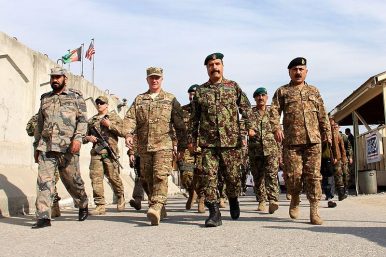By Umair Jamal
 The Trump administration, in its latest attempt to put pressure on Pakistan, has started to close various training programs for Pakistani military officials. Trump’s decision to shut down military training programs that have kept the two countries’ security institutions engaged means that Washington’s influence will further reduce over the country, particularly when it comes to the question of engaging with the national security establishment in Pakistan. Over the last two decades, one area of cooperation that remained off-limits to any bilateral rows was Washington’s intent to offer coveted training programs for Pakistani military officers, which have proven meaningful in the past when it comes to military-to-military relations between the two countries. While it’s unclear whether the latest decision was the result of a consensus among various security and diplomatic state institutions in the United States, the change is not going to become a factor that will shift Pakistan’s regional security policy, which appears to be the primary aim. On the other hand, however, it will certainly become a factor that will further drive away Pakistan’s national security apparatus when it comes to developing strategic ties with other states that are willing to fill the void being left by the United States.
The Trump administration, in its latest attempt to put pressure on Pakistan, has started to close various training programs for Pakistani military officials. Trump’s decision to shut down military training programs that have kept the two countries’ security institutions engaged means that Washington’s influence will further reduce over the country, particularly when it comes to the question of engaging with the national security establishment in Pakistan. Over the last two decades, one area of cooperation that remained off-limits to any bilateral rows was Washington’s intent to offer coveted training programs for Pakistani military officers, which have proven meaningful in the past when it comes to military-to-military relations between the two countries. While it’s unclear whether the latest decision was the result of a consensus among various security and diplomatic state institutions in the United States, the change is not going to become a factor that will shift Pakistan’s regional security policy, which appears to be the primary aim. On the other hand, however, it will certainly become a factor that will further drive away Pakistan’s national security apparatus when it comes to developing strategic ties with other states that are willing to fill the void being left by the United States.
A few months ago, Washington had conveyed to Pakistan that the military training component of U.S. aid would remain in place despite the suspension of the security assistance package. Traditionally, the U.S. military has sought to protect such educational programs from political tensions, arguing that direct military-to-military ties are strategic in nature and are crucial for future alliance building purposes. It has already been reported that one of the reasons that the military training component of Washington’s overall security assistance program for Pakistan continued for a long time was due to the direct interventions of various officials that deal with Pakistan and understand the nature of such contacts.
It’s also likely that Washington may revive the military training program for Islamabad in the near future, but Pakistan is not going to wait for any such development to take place. Pakistan has already signed a military training agreement with Russia and the first group of Pakistani military officers is expected to arrive in Russia soon. According to the agreement, the Pakistani military officials will receive training in Russia’s military institutes. Security cooperation between Islamabad and Moscow has expanded over the last few years. Among other things, Washington’s heavy-handed approach toward Pakistan has been considered one of the reasons driving it away from the United States.
The decision is likely to further isolate Washington’s remaining pockets of influence in Pakistan. Pakistan’s national security establishment, which prefers to maintain a working relationship with the United States, particularly in the area of security cooperation, is not going to appreciate a decision that directly targets its institutional professional development and outreach. It’s hard to fathom what the White House may be attempting to achieve with such a decision as it’s not likely to change Pakistan’s security policy and will only leave Washington more isolated when it comes to developing a direct rapport with Pakistan’s security institutions.
Moreover, an attempt to isolate Pakistan militarily at a time when the United States is trying to directly engage the Afghan Taliban doesn’t bode well for any effort to revive the Afghan peace process. Pakistan has big stakes in the Afghan peace process and an eventual settlement will have to incorporate Pakistan’s concerns. In that context, the ongoing targeting of the country’s security apparatus would simply create more distrust among the both country’s national security institutions, which are directly engaged in Afghanistan.
On the whole, the military training programs that Washington has offered to Pakistan, while developing a mutual sense of leverage, have been significant in terms of not only keeping Pakistan’s national security organizations engaged, but also as a mode to develop relations with young military officials, which on different occasions have gone on to take decision making roles in Pakistan. It’s anyone’s guess how Pakistan’s national security establishment will view the decision. Islamabad and Washington’s direct line of contact for the military-to-military relationship has suffered a serious blow.
No comments:
Post a Comment